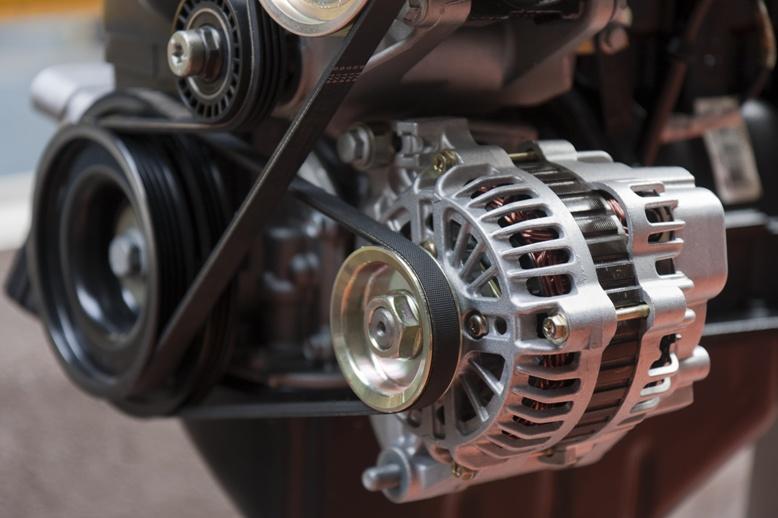What are the Signs of a Bad Alternator?
Have you ever jumped in the car, prepared to start the day, turn the key in the ignition and nothing happens? This is a stressful scenario, but hopefully, this article will give you some guidance of what is happening.
If you are unsure if the problem is with the starter, the battery, or the alternator, check your lights and other electrical devices. If the starter is bad then you'll most likely hear a faint click when turning the key and absolutely no other response. If the lights and other accessories in your car are completely dead, then the battery is most likely the issue. If your vehicle starts, but only after a struggle, it may be that your alternator is going bad.
The alternator is a key component in your car's electrical system, turning the energy from the crankshaft into useful electricity to power your vehicle's electrical systems and to help the battery recharge. When it starts to fail, it can create a domino effect of electrical problems that can ultimately cause a breakdown. What are the signs of a bad alternator?
- The indicator light -- This light in the dashboard titled "ALT" or "GEN" is often the first indicator that the alternator is going bad.
- Headlights are dim or flickering -- The alternator provides power to the headlights, so the flickering usually means the alternator is struggling to perform.
- Other electrical failures -- Other systems that are powered by the alternator may start to act up, including power windows, power locks, dashboard lights, air conditioning, or the car radio.
- Strange noises -- Alternator failure can cause some of the bearings to fail in the engine, creating unusual rattles.
- Car stalls or has difficulty starting -- When the alternator is failing, there might not be enough power in the spark plugs to keep the engine alive, which can cause it to stall for no reason while running, or to have trouble starting.
- Battery dies – A bad alternator can actually cause the battery to drain because it's failing to recharge it. If your battery goes dead, have the alternator checked when replacing the battery so it doesn't happen again.
Tip to Remember: If you pay attention to the sounds and actions of your vehicle when turning the key, you may be able to pinpoint whether there are problems with the car starter, the battery, or the alternator.
Wondering what are the signs of a bad alternator? Call our ASE Certified Technicians at Gary’s Quality Automotive for more information about a diagnostic test and to schedule an appointment. Our auto shop proudly serves vehicle owners in Grand Island, NE, Wood River, NE and Doniphan, NE.
If your vehicle is having starting problems, it may be starter, battery, or alternator. Ask your mechanic to know about signs of a bad alternator.
Have you ever jumped in the car, prepared to start the day, turn the key in the ignition and nothing happens? This is a stressful scenario, but hopefully, this article will give you some guidance of what is happening.
If you are unsure if the problem is with the starter, the battery, or the alternator, check your lights and other electrical devices. If the starter is bad then you'll most likely hear a faint click when turning the key and absolutely no other response. If the lights and other accessories in your car are completely dead, then the battery is most likely the issue. If your vehicle starts, but only after a struggle, it may be that your alternator is going bad.
The alternator is a key component in your car's electrical system, turning the energy from the crankshaft into useful electricity to power your vehicle's electrical systems and to help the battery recharge. When it starts to fail, it can create a domino effect of electrical problems that can ultimately cause a breakdown. What are the signs of a bad alternator?
- The indicator light -- This light in the dashboard titled "ALT" or "GEN" is often the first indicator that the alternator is going bad.
- Headlights are dim or flickering -- The alternator provides power to the headlights, so the flickering usually means the alternator is struggling to perform.
- Other electrical failures -- Other systems that are powered by the alternator may start to act up, including power windows, power locks, dashboard lights, air conditioning, or the car radio.
- Strange noises -- Alternator failure can cause some of the bearings to fail in the engine, creating unusual rattles.
- Car stalls or has difficulty starting -- When the alternator is failing, there might not be enough power in the spark plugs to keep the engine alive, which can cause it to stall for no reason while running, or to have trouble starting.
- Battery dies – A bad alternator can actually cause the battery to drain because it's failing to recharge it. If your battery goes dead, have the alternator checked when replacing the battery so it doesn't happen again.
Tip to Remember: If you pay attention to the sounds and actions of your vehicle when turning the key, you may be able to pinpoint whether there are problems with the car starter, the battery, or the alternator.
Wondering what are the signs of a bad alternator? Call our ASE Certified Technicians at Gary’s Quality Automotive for more information about a diagnostic test and to schedule an appointment. Our auto shop proudly serves vehicle owners in Grand Island, NE, Wood River, NE and Doniphan, NE.
